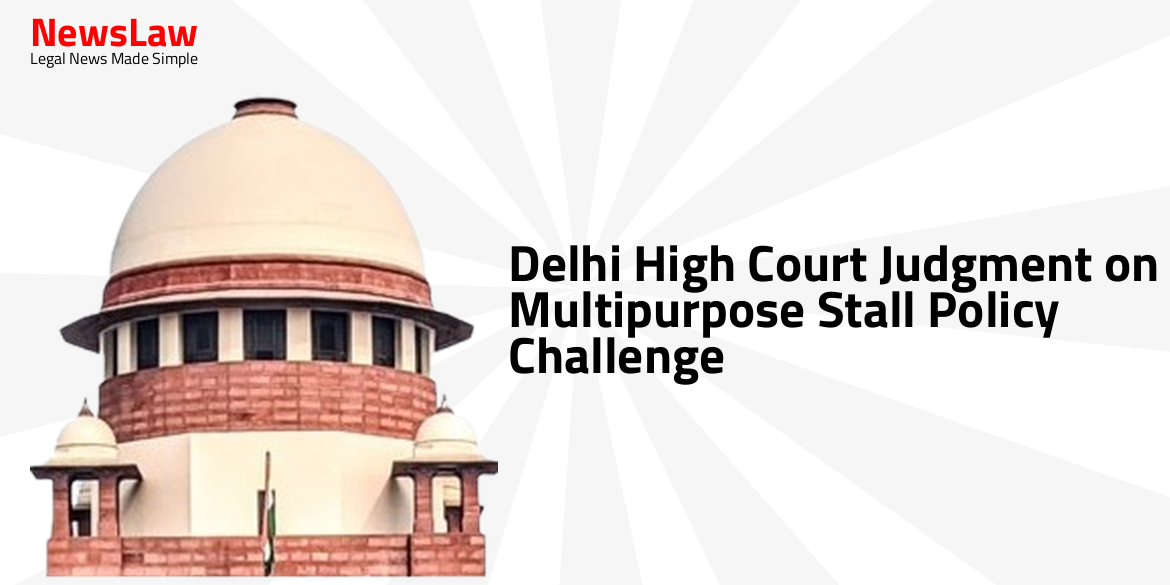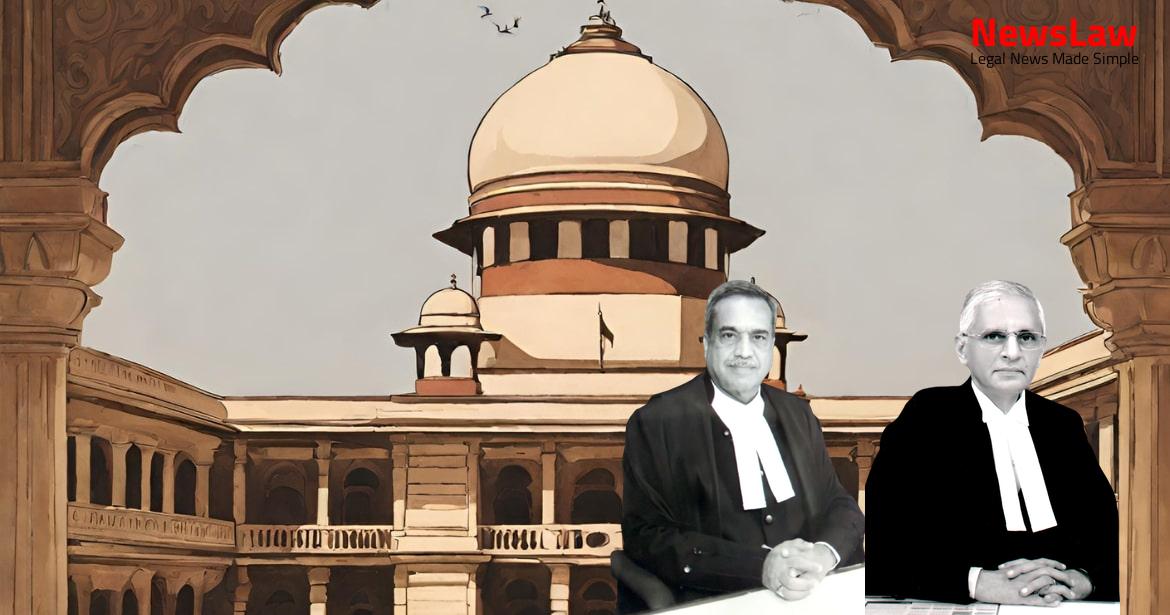In a recent ruling, the Delhi High Court adjudicated on the challenge to the Multipurpose Stall Policy. The case involved petitioners who contested Clause 5 and Clause 11 of the 2017 Policy framed by the Railway Board in Delhi. Respondent 2 and Petitioner 2, along with other stakeholders, were at the heart of the legal battle. Let’s delve into the details of this significant judgment and its impact on policy implementation and legal interpretation.
Facts
- Three petitioners have challenged Clause 5 and Clause 11 of the 2017 Policy framed by the Railway Board in Delhi.
- Due to a force majeure event (Covid-19 lockdown), the tenure of agreements was extended until 27.02.2023.
- Petitioner 2 and Respondent 2 have a Master License Agreement dated 29.10.2021.
- Petitioner 3 and Respondent 2 have a Master License Agreement dated 17.08.2020.
- Petitioners were directed to vacate their MPS by 27.02.2023 as per the extension letters.
- Petitioner 1 operates three MPS at Bareilly Railway Station.
- Petitioner 2 operates one MPS at Moradabad Railway Station.
- Petitioner 3 operates one MPS at Haridwar Railway Station.
- In 2017, Respondent 2 forced the petitioners to convert their stalls/trolleys to MPS based on Commercial Circular No 61 of 2017.
- Agreements were executed to confirm the license arrangements with specified tenures and no extension clause.
Arguments
- The petitioners’ licenses stand expired by efflux of time and they have no right to compel the respondents to extend the License.
- The 2017 Policy is legally sound and non-arbitrary, applicable universally to stall/trolley owners without discriminatory treatment towards the petitioners.
- The Karnataka High Court in a similar case dismissed a challenge against the 2017 Policy.
- Petitioners have availed benefits under the 2017 Policy and cannot contest it upon expiry of their license.
- Petitioners argue that clause 5 of the 2017 Policy is violative of Article 14, Article 19(1)(g), and Article 21 of the Constitution.
- Petitioners have a legitimate expectation for license renewal throughout their lifetime; relying on past practices.
- The petitioners are challenging the action of respondents who renew licenses for catering units but not for small miscellaneous stalls/trolleys.
- Petitioners also argue for an extension of the license period proportionate to the reduction in fees due to the decline in foot traffic at railway stations post-lockdown.
- Petitioners claim to have converted their stalls under coercion and unequal bargaining power.
- Petitioners maintain that there is no fundamental right to trade at a particular public space, subject to reasonable restrictions.
- The petitioner signed a contract for a non-renewable period of five years with eyes wide open.
- The petitioner enjoyed the benefits of the contract for five years.
- The petitioner cannot now go back to a policy that no longer exists.
- The Supreme Court judgment cited by the petitioner was related to Catering Policy, not Multipurpose Stall Policy.
- The petitioner’s contract falls under a different policy and not the Catering Policy.
- The petitioner cannot rewind the clock after benefiting from the contract and seek to be brought back under an earlier policy.
Analysis
- The petitioners’ contention that they were compelled to convert their stalls/trolleys to MPS is deemed untenable.
- The 2017 Policy explicitly renders the license non-renewable, precluding any extension or renewal of existing MPS units.
- The principle of legitimate expectation for the renewal of licenses by the petitioners lacks merit in accordance with Clause 5 of the 2017 MPS Policy.
- The jurisdiction to entertain a writ petition is determined by the location of the authority to whom the writ is directed, as per Article 226(1) of the Constitution.
- Reserved categories, including individuals below the poverty line, are accorded specific allocations of MPS units to ensure equitable access to livelihood opportunities.
- The determination of dies non period for individual contracts/stations was based on ground realities by respective zonal/divisional railways post lockdown period.
- The petitioners can participate in fresh bids, as per Clause 5 of the 2017 Policy, if they meet eligibility criteria, dispelling claims of permanent, indefinite license renewal rights.
- Policy decisions for better administration and exigencies are within the executive realm and not for the courts to legislate, protecting the railways’ flexibility in operational models.
- The 2017 Policy safeguards rights of marginalized minorities and weaker sections of society in line with constitutional principles of social welfare, ensuring equitable opportunities.
- A writ impacting the validity of a policy clause like para 1744 would need to be issued to the Railway Board located in New Delhi, defining the jurisdiction for specific writs.
- A license only confers the right to use the grantor’s property, revocable at the grantor’s will, without transferring any interest to the grantee, as per the nature of a license.
- Original names of the parties were not used in the judgment
- The extract mentioned is from point 55 of the judgment
- The relevant part pertains to a certain aspect of the case
- In the case of Gulfeeza Begum v. Union of India, the Karnataka High Court rejected a challenge to the 2017 Policy regarding Civil Services Examination.
- The Court stated that past relaxations in policy due to changes in examination patterns do not entitle participants to claim similar relaxation as a right.
- A writ of Mandamus cannot be used to direct the enactment of laws or framing of rules, it is for enforcing fundamental or statutory rights.
- For issuing a writ of Mandamus, a breach or threat to breach a fundamental, statutory, or enforceable equitable right must be evident.
- The court upheld the principle that it cannot delve into the intricacies of operational decisions unless they violate fundamental rights or legality.
- Judicial review of a policy decision is distinct from mandating the framing of policy in a specific manner.
- A legitimate expectation does not always entitle an individual to relief, as factors like public interest or policy changes may negate it.
- Public bodies cannot arbitrarily decline to renew licenses and must have rational grounds based on valid reasons.
- The court’s role is to interpret laws and policy decisions, ensuring they serve a rational purpose and are not arbitrary.
- Individual license agreement and 2017 Policy contain arbitration clause for grievances related to Covid-19 situation or claims for damages
- Petitioners can invoke the arbitration clause and initiate appropriate proceedings if aggrieved
Decision
- Existing stalls/trolleys have the option to convert into Multipurpose Stalls (MPS) by paying the quoted License Fee.
- No new allotments or renewals of existing stalls/trolleys will be done by the railways.
- Existing stalls/trolleys can be converted into MPS as per the policy.
- A 5-year tenure will commence from the date of conversion into MPS.
- The conversion process for existing licensees into MPS must be completed within 90 days.
- The Multi-Purpose Stall policy supersedes previous policies unless specifically referred to.
- Petitioners have two options: convert existing stalls/trolleys to MPS or continue until the current agreements expire.
- Petitioners opted to convert to MPS under the 2017 Policy.
- A transition period of 3 months is granted for petitioners to vacate the stalls after the extended license period.
- Renewal of License process is mentioned for miscellaneous stalls/trolleys.
- The present petitions are dismissed with rights and remedies kept open.
- All pending applications are disposed of.
- Common issues for consideration in the batch of matters are entertained and adjudicated on merits.
Case Title: SHIV PRASAD SAHU Vs. UNION OF INDIA & ORS. (2024:DHC:4452)
Case Number: W.P.(C)-11339/2023



